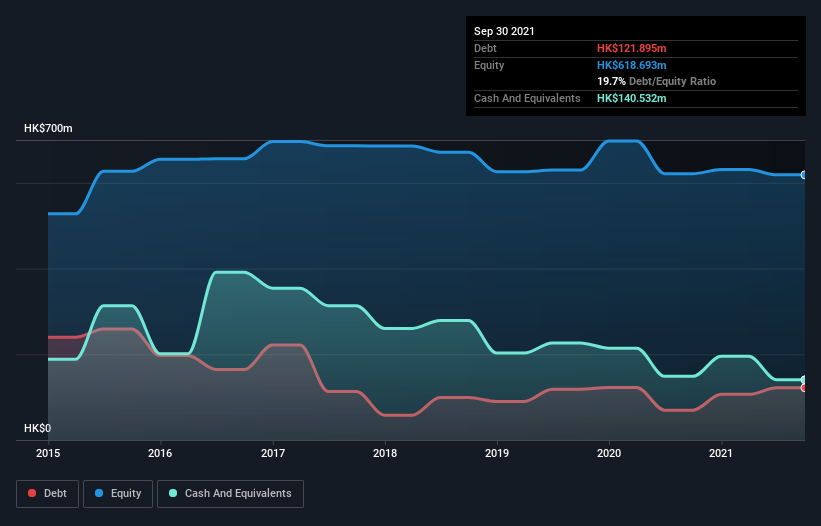- Hong Kong
- /
- Construction
- /
- SEHK:3822
Health Check: How Prudently Does Sam Woo Construction Group (HKG:3822) Use Debt?
Howard Marks put it nicely when he said that, rather than worrying about share price volatility, 'The possibility of permanent loss is the risk I worry about... and every practical investor I know worries about.' So it seems the smart money knows that debt - which is usually involved in bankruptcies - is a very important factor, when you assess how risky a company is. We can see that Sam Woo Construction Group Limited (HKG:3822) does use debt in its business. But should shareholders be worried about its use of debt?
What Risk Does Debt Bring?
Generally speaking, debt only becomes a real problem when a company can't easily pay it off, either by raising capital or with its own cash flow. Ultimately, if the company can't fulfill its legal obligations to repay debt, shareholders could walk away with nothing. While that is not too common, we often do see indebted companies permanently diluting shareholders because lenders force them to raise capital at a distressed price. Of course, the upside of debt is that it often represents cheap capital, especially when it replaces dilution in a company with the ability to reinvest at high rates of return. The first thing to do when considering how much debt a business uses is to look at its cash and debt together.
Check out our latest analysis for Sam Woo Construction Group
How Much Debt Does Sam Woo Construction Group Carry?
You can click the graphic below for the historical numbers, but it shows that as of September 2021 Sam Woo Construction Group had HK$121.9m of debt, an increase on HK$69.7m, over one year. However, its balance sheet shows it holds HK$140.5m in cash, so it actually has HK$18.6m net cash.

A Look At Sam Woo Construction Group's Liabilities
Zooming in on the latest balance sheet data, we can see that Sam Woo Construction Group had liabilities of HK$215.4m due within 12 months and liabilities of HK$65.5m due beyond that. Offsetting these obligations, it had cash of HK$140.5m as well as receivables valued at HK$176.0m due within 12 months. So it can boast HK$35.5m more liquid assets than total liabilities.
This surplus suggests that Sam Woo Construction Group is using debt in a way that is appears to be both safe and conservative. Because it has plenty of assets, it is unlikely to have trouble with its lenders. Simply put, the fact that Sam Woo Construction Group has more cash than debt is arguably a good indication that it can manage its debt safely. When analysing debt levels, the balance sheet is the obvious place to start. But you can't view debt in total isolation; since Sam Woo Construction Group will need earnings to service that debt. So if you're keen to discover more about its earnings, it might be worth checking out this graph of its long term earnings trend.
In the last year Sam Woo Construction Group had a loss before interest and tax, and actually shrunk its revenue by 41%, to HK$445m. To be frank that doesn't bode well.
So How Risky Is Sam Woo Construction Group?
By their very nature companies that are losing money are more risky than those with a long history of profitability. And we do note that Sam Woo Construction Group had an earnings before interest and tax (EBIT) loss, over the last year. Indeed, in that time it burnt through HK$55m of cash and made a loss of HK$3.1m. But the saving grace is the HK$18.6m on the balance sheet. That kitty means the company can keep spending for growth for at least two years, at current rates. Even though its balance sheet seems sufficiently liquid, debt always makes us a little nervous if a company doesn't produce free cash flow regularly. The balance sheet is clearly the area to focus on when you are analysing debt. But ultimately, every company can contain risks that exist outside of the balance sheet. Be aware that Sam Woo Construction Group is showing 3 warning signs in our investment analysis , and 1 of those shouldn't be ignored...
If, after all that, you're more interested in a fast growing company with a rock-solid balance sheet, then check out our list of net cash growth stocks without delay.
New: Manage All Your Stock Portfolios in One Place
We've created the ultimate portfolio companion for stock investors, and it's free.
• Connect an unlimited number of Portfolios and see your total in one currency
• Be alerted to new Warning Signs or Risks via email or mobile
• Track the Fair Value of your stocks
Have feedback on this article? Concerned about the content? Get in touch with us directly. Alternatively, email editorial-team (at) simplywallst.com.
This article by Simply Wall St is general in nature. We provide commentary based on historical data and analyst forecasts only using an unbiased methodology and our articles are not intended to be financial advice. It does not constitute a recommendation to buy or sell any stock, and does not take account of your objectives, or your financial situation. We aim to bring you long-term focused analysis driven by fundamental data. Note that our analysis may not factor in the latest price-sensitive company announcements or qualitative material. Simply Wall St has no position in any stocks mentioned.
About SEHK:3822
Sam Woo Construction Group
An investment holding company, provides foundation works and ancillary services in Hong Kong and Macau.
Good value with mediocre balance sheet.
Similar Companies
Market Insights
Community Narratives



